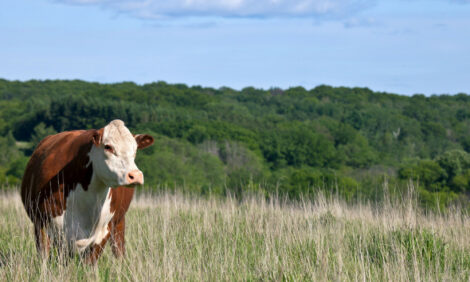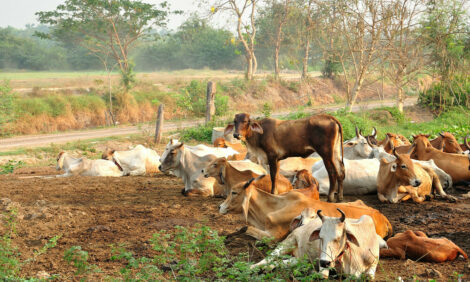



Finding the Links Between Genomics & Health
US - A groundbreaking study at Colorado State University may lead to early identification of animals with less susceptibility to feedlot diseases, especially bovine respiratory disease (BRD)."This landmark research is providing us with greater insight into the genetic markers responsible for improved feedlot health, a promising significant breakthrough for the beef industry," says Nigel Evans, Ph.D., Vice President of Pfizer Animal Genetics.
The study is the first of its kind and is sponsored by Pfizer Animal Genetics and the National Beef Cattle Evaluation Consortium (NBCEC).
"Pfizer believes in the opportunity to marry genetics and disease susceptibility to initiate significant improvements in animal health," says Dr. Evans. "This study reinforces the importance of research that will lead to economically relevant management solutions for beef producers."
The study design and funding originated from the NBCEC, a group of universities focused on furthering genetic evaluations of beef cattle. The organization had recently completed a pilot study at Iowa State University that showed encouraging results for genetic control of pinkeye, says NBCEC Director Dr. John Pollak. As a next step the group decided to focus on the most prevalent disease in feedlot cattle: BRD.
* "By identifying key genetic markers, the industry can better develop tools for producers to decrease morbidity and mortality" |
|
Dr. Mark Enns of Colorado State University, lead researcher.
|
"As an organization, one of our goals has been to identify genetic traits related to animal health, which is difficult on a large-scale industry level," says Dr. Pollak. "Focusing on animal health, we identified BRD as one of the obvious diseases on which to focus our efforts. We hope the study results will lead to panels of markers indicative of animals less susceptible to BRD."
Dr. Pollak identified multiple specialists to serve as members of the research team with Dr. Mark Enns of Colorado State University as the lead researcher. The ongoing research combines multiple past study designs to create a unique methodology focused on genetics under commercial feedlot conditions.
"Our goal with this study is to maximize producer profitability through healthier animals, improved animal welfare and the use of effective genetic management tools," says Dr. Enns. "By identifying key genetic markers, the industry can better develop tools for producers to decrease morbidity and mortality, resulting in more profits for beef producers throughout the industry."
The study, which began in 2007 and ends next year, involves more than 3,000 steers. All animals originate from one large commercial beef operation and are being fed at a Colorado commercial feedlot. All animals have been genotyped and performance and health traits will be monitored throughout the research while overall health and carcass quality will be charted after harvest.
The first-year data already is being used to discover and identify possible genetic marker panels that are indicative of animals less susceptible to common feedlot diseases. Currently in its second year, researchers are beginning to validate research results.
Data from the study also is being utilized by Pfizer Animal Health Veterinary Medicine Research and Development (VMRD). Pfizer is looking at the synergies between animal health and genetics to develop therapies that will improve the health of the animal, says Director of Livestock Pharmaceuticals Jeffrey Watts, Ph.D., Pfizer Animal Health.
"Pfizer believes the Colorado State University research will help us in developing new products which can be tailored for certain management protocols that fit the needs of the animal subpopulations in the feedlot," says Dr. Watts. "For example, in the future it may be possible to design pharmaceuticals to fit animals based on their genetic predispositions for carcass quality, tenderness and susceptibility to common feedlot diseases."
"We may find that as we improve animal growth and productivity, animals will remain susceptible to certain diseases," adds Dr. Watts. "From a protocol standpoint we will be able to recommend different management regimens to treat common feedlot diseases and improve the overall performance based on an animal's specific genetic makeup."
Pfizer Animal Genetics is a business unit of Pfizer Animal Health, a world leader in discovering and developing innovative animal vaccines and prescription medicines. Pfizer Inc. is the world's largest research-based pharmaceutical company.
TheCattleSite News Desk


